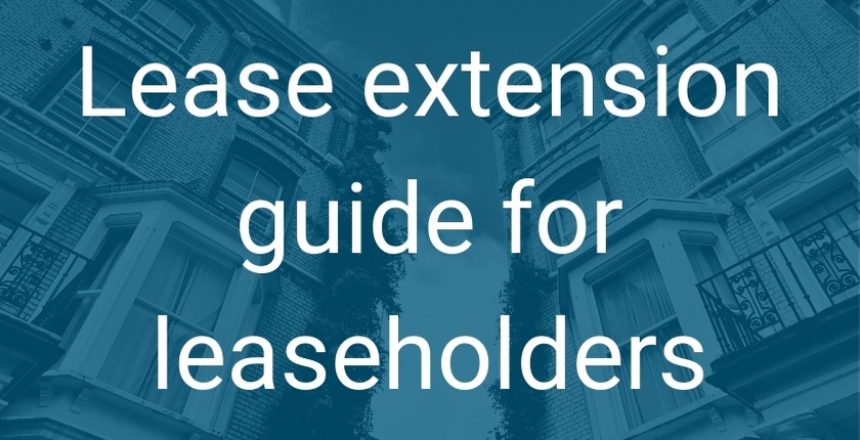If you’re thinking of buying a leasehold flat or already own one, this lease extension guide is an ideal read for you. Understanding lease extensions and your legal rights will enable you to make informed decisions regarding your property and ultimately help you to save thousands of pounds.
What is a lease extension?
Put simply, a lease extension is an increase in the number of years you are entitled to live in your leasehold property. That might sound a bit odd if you have a mortgage on the property or perhaps own it outright, but you are effectively only a tenant in your home. This is because the freeholder, who may otherwise be known as your landlord, owns the land on which your property is situated and has outright ownership of the properties on the land.
As the owner of the land, the freeholder gets to decide how long you are allowed to live on his property. And in return for living on his land, each leaseholder will have to pay a yearly ground rent, which is again determined by the freeholder. Both the amount of ground rent that you pay, and the length of your lease will be set out in the terms of the lease.
What is a lease?
A lease is a legal contract between you (the leaseholder) and your landlord. It documents your rights, responsibilities and obligations as the leaseholder, as well as those of the freeholder. On purchasing your property, your solicitor should have discussed your lease with you to ensure that you were aware of the terms of owning your leasehold property.
The term ‘lease’ is usually used to describe a ‘long lease’, which is what most leasehold properties are granted with. To be deemed a long lease, the original lease term must have been for a minimum of 21 years. Interestingly, a long lease will hold that title even when the remaining lease term falls below 21 years. Most leases are granted for a term of 99-125 years; however, some stretch to a whopping 999 years.
In the case of such an incredibly long lease, a freehold property is typically referred to as a ‘virtual freehold’. This is because the expiration of the lease is so far in the future that it will be of no concern to the leaseholder or his immediate descendants. Of course, they will still be governed by the terms of their lease.
Unlike most short-term leases (such as assured shorthold tenancies) a long lease is transferable by the leaseholder. So, when the property is sold, the remainder of the lease term will be assigned to the new owner. This means that the number of years remaining on the lease may be much lower than the original lease term granted.
For example, if the original lease term was 99 years and the property is 40 years old, there will only be 59 years remaining on the lease. Unfortunately for leaseholders, the lower the number of years remaining on the lease, the less valuable your property will be. This is why leasehold properties can be referred to as a diminishing asset.
Why does the length of the lease affect the property’s value?
This is because when the number of years remaining on the lease hits zero, the property will revert back to the freeholder! Of course, you can extend the lease, but this becomes significantly more expensive the lower the number of years that remain on the lease – we’ll delve further into this subject later on.
As a result of this, most lenders will not offer mortgages on properties with less than 65 years. This means that it could be considerably more difficult to sell the property as you would be limited to cash buyers.
What happens when your lease runs out?
As mentioned above, when your lease expires, the freeholder can legally take ownership of your property. This means that you will lose any equity that you have in the property and you may be forced to vacate. The somewhat good news is that the freeholder can only regain possession on a limited number of grounds. Also, you can only be made to leave the property by court order for possession.
So, if the freeholder wants to gain possession, they will have to serve notice on you in a prescribed format to end the tenancy. The notice cannot be served before your lease has ended and must state the grounds on which he wishes to gain possession. Alternatively, your landlord may decide to offer you an assured periodic tenancy by way of an official notice, in order to end the tenancy.
If you accept the offer of an assured periodic tenancy, you will be allowed to remain in the property in return for paying a monthly rent to your landlord. However, you will still lose ownership of your property and will be governed by new lease terms.
In the event that the landlord does not serve notice, you will not have to leave your property. In fact, you will not need to do anything, and the tenancy will continue unless you or the freeholder decide to end it. Hopefully, though, you will not find yourself in this difficult position.
Obtaining a lease extension
To avoid the dire consequences of an expired lease, it’s highly advisable to seek a lease extension. If you have lived in the property for more than two years, you are legally entitled to extend your lease by 90 years under the Leasehold Reform Housing & Urban Development Act 1993. When doing so, you will also be entitled to a peppercorn ground rent, which will effectively mean that you no longer have to pay any ground rent.
Nevertheless, as we touched on earlier, subject to the number of years remaining on your lease, an extension can be extremely costly. In fact, it’s not uncommon for a lease extension to reach tens of thousands of pounds. Fortunately, most landlords are happy to negotiate with you to find a solution that works for you financially.
For example, your landlord may offer you the opportunity to pay a lower premium for your lease extension in return for a slightly higher annual ground rent. You could look at this as though you are spreading the cost of the lease extension over the lease term. So, if you decide to sell your property, you may not have to pay for the entire lease extension as part of the cost would be passed onto the new owner. This could potentially save you thousands.
It may also be possible to negotiate the number of years you would like to extend by. You may find this incredibly valuable if you plan to pass the property onto your children or grandchildren, as it would help to secure the future of the property for longer. Depending on your circumstances then, negotiating a lease extension with your landlord can be a much more advantageous route than the statutory 90 years and peppercorn ground rent entitlement.
When should you extend your lease?
This all depends on how many years you have remaining on your lease. The lower the length of the lease, the costlier it will be to extend. So, it makes good sense to extend sooner rather than later. However, the point at which the cost to extend your lease becomes really significant is at 80 years.
As soon as your lease term falls below 80 years, the cost to extend your lease will start to increase rapidly. This is because you will also have to pay marriage value on top of the lease extension premium. Marriage Value is 50% of the difference in value between your property having a short lease (before renewing) and when the lease is extended.
For example, if your property is currently worth £270,000 with its short lease but will be worth £300,000 when you extend the lease, the marriage value is £30,000. You will then have to pay 50%, which equals £15,000, in addition to the lease extension premium. Marriage value is essentially the freeholder’s share of the increase in the property’s value.
If you don’t already know, now is a good time to find out how many years are remaining on your lease. You should have been issued with a copy of your lease by your solicitor when you purchased the property. However, If you are unable to find it, you may be able to purchase an official copy from Land Registry. Alternatively, if you have a mortgage, you should be able to request a copy of the lease from your lender.
Calculating the cost to extend your lease
The cost to extend your lease is determined under Schedule 13, Part II of the Leasehold Reform, Housing and Urban Development Act 1993. The premium amount is set in order to compensate the landlord for the reduction in the value of his interest in the flat. And as discussed above, it can also include the landlord’s share of marriage value. This is the landlords right as the owner of the land and the building in which your flat resides.
To determine the cost to extend your lease, a number of different factors need to be considered. These include but may not be limited to the following:
- The current market value of the property
- The number of years left on the lease
- Ground rent payable
- The value of the property once the lease extension has been granted
There are a number of ways in which you can find out how much it would cost to extend your lease, but the recommended way is via a valuation from a chartered surveyor. This can cost up to £1,000 +VAT depending on the value and location of your property, however, it is the only legally recognised form of valuation.
Nevertheless, a formal valuation is not required under the Act as long as both the freeholder and leaseholder can agree or negotiate a lease extension premium. If an agreement on the premium cannot be reached, an application to the First-tier Tribunal can be made by either party. The courts will then determine a premium that will adequately compensate the freeholder while being fair to the leaseholder.
In the meantime, you can get an estimation of how much it would cost to extend your lease, using an online lease extension calculator. These are free to use but it’s worth noting that results can vary and cannot be relied upon for tribunal or court proceedings. Therefore, it would be wise not to make any decisions regarding your property based on results from an online calculator. Always seek advice from a legal professional.
Other costs to consider
Professional fees – You’ll need to pay for your professional and legal fees plus the freeholder’s reasonable costs and valuation fees. This can total as much as £2,500 in valuation fees and another £2,500 in legal fees.
Stamp duty – Stamp duty will be applied to lease extension purchases but only when the purchase price exceeds £125,000.
Paying for your lease extension
Finding out how much it costs to extend your lease can be a bit daunting. Most people don’t have that kind of spare cash lying around and if we do, we certainly don’t want to see it leave our bank accounts. Nevertheless, if we want to secure the future of our homes, a lease extension is a necessary evil.
If you don’t have the capital required to extend your lease, you may be able to obtain a low-cost loan or even use an interest-free credit card. Alternatively, your mortgage lender may be willing to provide you with the capital as an extension on your mortgage. In fact, most lenders are happy to do this as it increases the value of the property in which their interest is held. With any loan or credit, it is important to ensure that you can afford the repayments
Another method of paying for a lease extension is through the sale of your property. Most freeholders will agree for a lease extension premium to be paid out of the capital achieved from selling your property. You will both agree to the terms, sign contracts and then the property can be marketed as though it has the new lease extension. As you’ll need a long lease term in order to attract more buyers and attain a high price for your property, this can be an incredibly favourable opportunity for you.
An alternative solution
If you don’t like the thought of having to extend your lease and being beholden to your landlord, it may be worth considering collective enfranchisement. This is where you join forces with the other leaseholders in your building to purchase the freehold collectively. This is your legal right under the Leasehold Reform Housing & Urban Development Act 1993.
In order to qualify for collective enfranchisement, you and the other leaseholders in your building would need to meet certain criteria. Furthermore, the building in which the flats are held must also conform to the requirements under the Act. However, if you are able to proceed it would mean you would not have to pay to extend your lease and you would no longer have to pay ground rent.
Collective enfranchisement can be undertaken at any time during the term of your lease or even after the date of expiry if your landlord has not served notice to end the tenancy.
Learn more about collective enfranchisement


